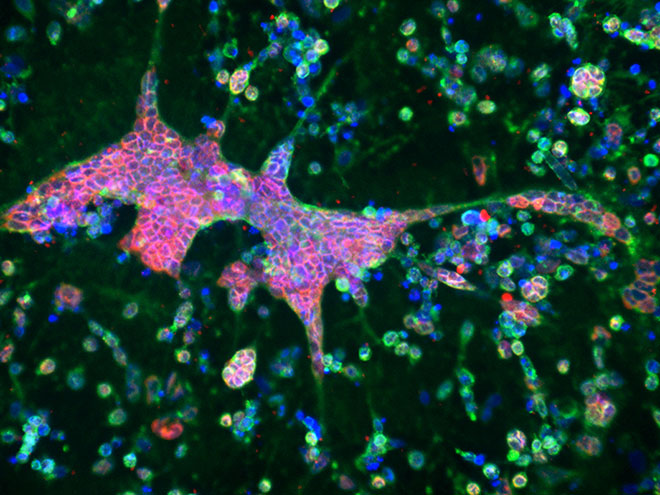A class of antiviral drugs that fight inflammation, designed for HIV, might also reduce the risk of developing Alzheimer’s by as much as 13 percent. The study adds to evidence that viruses and Alzheimer’s are closely linked.
The idea that infection could spark Alzheimer’s is going viral, bolstered by new data that targeting viruses might reduce the risk of developing the disease. Two recent studies found that the shingles vaccine slashes the risk of developing Alzheimer’s by one fifth. Other researchers are testing whether antivirals targeting the Herpes virus could treat Alzheimer’s in clinical trials. Now, after reviewing hundreds of thousands of electronic health records, scientists have spotted another antiviral drug they think could prevent Alzheimer’s. And the mechanism behind it could help explain why some of these antiviral treatments seem to give the brain a protective boost.
In a new study published in Alzheimer’s & Dementia, researchers — whose research was funded by grants from the National Institutes of Health — zeroed in on a class of HIV and hepatitis B medications called nucleoside reverse transcriptase inhibitors. NRTIs prevent viruses from making copies of themselves. People who took NRTIs, as opposed to other antiviral medications to treat their infection, had a six to 13 percent lower risk of developing Alzheimer’s.
“Our results suggest that taking these drugs could prevent approximately one million new cases of Alzheimer’s disease every year,” said the study’s senior author, Jayakrishna Ambati, professor at the University of Virginia.
The team reviewed two databases to see whether people over 50 prescribed NRTIs for treating HIV or hepatitis B infection were less likely to develop Alzheimer’s than people prescribed other antivirals. They looked at data from two insurance databases:
- 24 years of data on 72,193 people from the U.S. Veterans Health Administration Database, of whom 97 percent were men
- 14 years from the MarketScan database of 199,005 commercially insured patients, of whom 66 percent were men.
Controlling for demographic data and other diseases like high blood pressure and cholesterol that increase the risk of developing Alzheimer’s, NRTIs had a protective effect across both databases. Due to the nature of the study, it can’t tell us whether these drugs would work just as well in people without HIV or Hepatitis B.
Dr. Glen R. Finney, a fellow at the American Academy of Neurology and the director of the memory and cognition program at Geisinger Health, who wasn’t involved in the research, told Being Patient that the study found an interesting association between NRTIs and Alzheimer’s.
“The strength of the study is that it had a large population of participants that were looked at from two large patient pools that were different enough from each other that finding that association in both groups gives some hope this is a true effect,” said Finney. “The limitation is that these were essentially large data look back (retrospective) studies rather than prospective clinical trials.”
Why NRTIs? Ambati’s previous research suggested that this class of drugs stops a major conglomerate of inflammatory proteins called the inflammasome. Individual immune system proteins, like Power Rangers, combine into the inflammasome, like the Megazord, to fight infection and cellular stress. Often, inflammasomes kill off infected and sick cells before disease spreads, but this process might go haywire in Alzheimer’s.
“One big role of the immune system is to kill sick cells before they can infect other healthy cells in things like viruses, but when cells are sick or mistaken for being sick in non-infectious problems, that cell death can be devastating to organs like the brain,” said Finney.
The tricky part, he said, is that if NRTIs really do work for Alzheimer’s, then it is hard to tell whether they only work to prevent the disease or if they could help patients who already have symptoms.
Ambati, also the co-founder of Inflammasome Therapeutics, is developing a safer version of NRTIs called K9. “This drug is already in clinical trials for other diseases, and we plan to also test K9 in Alzheimer’s disease,” he said.





